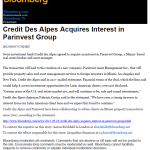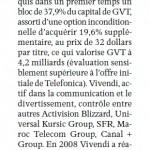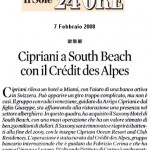
Download original clipping
Translated from the original article
Private Equity, investors focused on Italy
Cerina (Crédit des Alpes): smaller transactions, but higher returns
After a period of absence from the Italian market, investment bank Crédit des Alpes, led by chairman Fabrizio Cerina, has returned to operate in Milan. Cerina was born in Piacenza but had lived and worked for many years both in Geneva and London.
One factor that prompted the return is the Casa Cipriani project which is soon to open in Palazzo Bernasconi located on Corso Venezia in the heart of upscale Milan. The member’s club managed by Cipriani encompasses 7,000 square meters, including 16 hotel suites, two restaurants, bar “Arrigo”, and an elegant wellness center. Cerina explains, “We have acted as the investment bank, bringing together different interests, such as Merope Fund, the owner of the property, whose head Pietro Croce led the transaction. The real estate mediation was carried out by Luca De Ambrosis’ Dea. This is a dynamic moment for the Italian brick-and-mortar market. Several other operations are possible as well”.
Crédit des Alpes works mainly with non-Italian institutional clients. In fact, almost exclusively with US and London investment funds, as well as other banks that are generally listed in the respective countries of origin, while the group is not active in private banking. Of the approximately 300 private equity and mergers and acquisitions that the bank has conducted on four continents in the last 25 years, only five were in Italy. The most important being Redaelli Tecna, acquired by Crédit des Alpes with Kohlberg & Co. of New York, which dates back about twenty years ago, and the sale of an important property owned by Crédit des Alpes to Cometa Fund. Now, however, there is newfound attention to the Peninsula. “For too many years,” states Cerina, “Italy has been considered a Cinderella in international markets. This was mainly due to the period of confusion in Italian politics. In the last two years, two factors have intervened to change this perception. First the government, now led by Mario Draghi, is an important turning point, as this gave the sign of newfound international credibility to Italy. Secondly, at almost the same time, private equity operators have reconsidered their investment size in both the manufacturing and real estate sectors. Italy has different dimensions compared to what large private equity operators are used to on Anglo-Saxon markets. Alongside some major operations currently in progress, there are medium-sized investors interested in the Italian market. The difficulty of allocating the considerable resources with the prospect of appealing returns has driven investors to work with tickets of between 30 and 60 million euros.”
The cultural gap has been overcome. In Great Britain and The United States, the investment focus has been on companies with a turnover between 100 and 500 million euros. In Italy, the minimum limit becomes much lower, but the rate of return on investments is often higher than abroad. “There are more transactions of smaller dimensions,” says Cerina. “In the end, it is only a matter of working more. But that is not a problem. In Italy, there are many attractive sectors such as cosmetics and beauty care in general, health care, with particular reference to the silver economy and consumer goods. Above all, whatever is distributable online is appealing. Today the proportion of sales distributed through the digital channel of total sales in Italy is around 10 percent. In France, around 20 percent, and in Great Britain 30 percent. Thus, there are important margins for growth. All of this will have a significant impact on various sectors, above all real estate dedicated to logistics. There is no shortage of opportunities. We are very interested in Italy, in investing our own capital, as well as that of our international customers. We are actively looking for suitable targets” concludes Cerina. Stefano Righi
Private Equity, gli investitori puntano sull’Italia
Cerina (Crédit des Alpes): operazioni più piccole, ma rendimenti più alti
Dopo un lungo periodo di assenza dal mercato italiano, torna a riaffacciarsi a Milano Crédit des Alpes, la investment bank guidata come presidente da Fabrizio Cerina, banchiere nato a Piacenza ma che da molto tempo vive e lavora tra Ginevra e Londra. A propiziare il rientro è la realizzazione del progetto Casa Cipriani, a palazzo Bernasconi, nel centralissimo Corso Venezia. Sta infatti per aprire, su 7 mila metri quadrati, quello che diventerà un Member’s club gestito da Cipriani, con due ristoranti, 16 suites d’albergo, un bar («Arrigo») e una grande Spa. «Noi — spiega Cerina — abbiamo agito da banca d’affari, mettendo assieme interessi diversi, come quelli del Fondo Merope, proprietario dell’immobile e guidato in questa operazione da Pietro Croce. La parte di mediazione immobiliare è stata svolta da Dea, di Luca De Ambrosis. È un momento di grande dinamismo sul mercato del mattone italiano e ci sono parecchie altre operazioni possibili». Crédit des Alpes tratta clientela istituzionale soprattutto non italiana, quasi esclusivamente fondi d’investimento statunitensi e londinesi e altre banche, generalmente quotati nei rispettivi Paesi d’origine, mentre il gruppo non è attivo nel private banking. Su circa 300 operazioni di private equity e fusioni e acquisizioni che la banca ha condotto su quattro continenti negli ultimi 25 anni, solo cinque si sono realizzate in Italia: le più importanti sono state Redaelli Tecna, che Crédit des Alpes aveva acquisito con Kohlberg & Co. di New York e che risale a una ventina d’anni fa, oltre a un’operazione di real estate con la cessione di un importante immobile di proprietà di Crédit des Alpes al Fondo Cometa. Ora, invece, si registra una ritrovata attenzione verso la Penisola. «Per troppi anni — sottolinea Cerina — sui mercati internazionali l’Italia è stata considerata come una Cenerentola, a causa, soprattutto, del periodo di confusione nella politica italiana. Nell’ultimo biennio sono intervenuti due fattori che hanno cambiato questa percezione. Internamente si è insediato il governo guidato da Mario Draghi, che ha dato una svolta al Paese nel segno di una ritrovata credibilità internazionale. E quasi contemporaneamente gli operatori del private equity hanno riconsiderato le loro size di investimento. Sia nelle imprese operative, produttive, che nell’immobiliare. L’Italia ha dimensioni diverse rispetto a quanto sono abituati i grandi operatori del private equity sui mercati anglosassoni. E a fianco di alcune grandi operazioni, come quelle in corso, ora si affiancano medi investitori interessati al mercato italiano. Così ora, sulla spinta della difficoltà ad allocare le notevoli risorse disponibili e alla luce di percentuali di ritorno sull’investimento davvero interessanti, si è rivista la dimensione dell’investimento con ticket anche tra i 30 e i 60 milioni di euro».Il gap, quasi di natura culturale, è stato superato. Se in Gran Bretagna e negli Stati Uniti gli interventi si rivolgono soprattutto ad aziende con fatturato tra i 100 e i 500 milioni di euro, in Italia il limite minimo diventa assai minore, ma il tasso di ritorno sugli investimenti è spesso superiore rispetto all’estero. «Si fanno più transazioni, di minor dimensione — sostiene Cerina —: alla fine si tratta solamente di lavorare di più. Ma non è questo un problema. Ci sono, in Italia, molti settori attraenti, penso alla cosmetica e al beauty care in generale, l’health care, con particolarmente riferimento alla silver economy e i consumer goods. Su tutto, poi, quanto è distribuibile online. Oggi la proporzione delle vendite attraverso il canale digitale sul totale delle vendite in Italia è attorno al 10 per cento. In Francia si aggira sul 20 per cento, in Gran Bretagna è al 30 per cento. Ci sono dunque margini importanti di crescita e tutto questo avrà un impatto rilevante in vari settori, su tutti la parte immobiliare dedicata alla logistica. Le occasioni non mancano. Noi siamo molto interessati all’Italia, ad investirci capitali nostri e della nostra clientela internazionale. Stiamo cercando attivamente dei target appropriati», conclude Cerina. Stefano Righi










